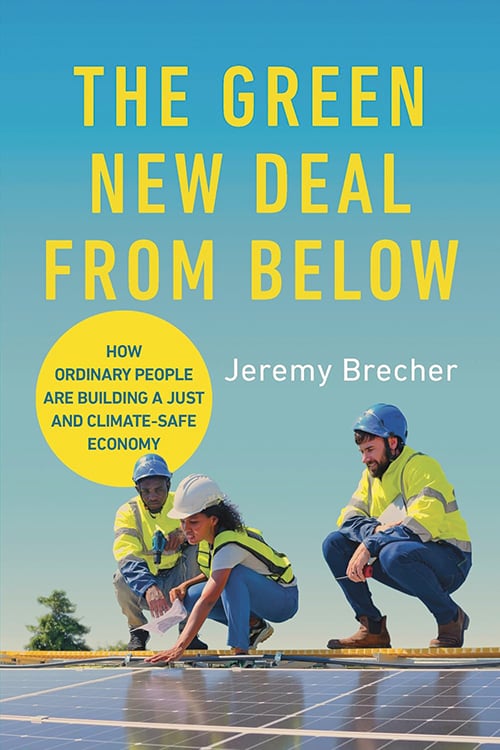
In Brief: The Green New Deal from Below: How Ordinary People Are Building a Just and Climate-Safe Economy
Reviewed by Abigail E. Adams
October 1, 2025
By Jeremy Brecher. University of Illinois Press, 2024. 224 pages. $21.95/paperback; $14.95/eBook.
This book, published during 2024’s election year, might appear irrelevant, given current assaults on climate resilience progress. It is not. Author Jeremy Brecher, cofounder of the Labor Network for Sustainability, reminds us that the federal government has always blocked the Green New Deal. His book provides Friends and others with many examples of successful programs, collaborations, legislation, and other policies “from below.”
Following a review of what has worked—and failed—for cities, states, unions, and tribal and other frontline communities, Brecher analyzes the complexities of building climate-safe economies based on renewable energy production, conservation, and fossil fuel phaseout, with one chapter on transforming transportation, the largest source of greenhouse gases. The final three chapters describe how such economic transformations must maintain an unwavering commitment to “just transitions” for vulnerable workers and communities.
I admire Brecher’s integrity in describing setbacks and narrow pro-environment policies that ended up harming workers and communities. His case studies feature complexities and large challenges. Much of this book could be read as a manual, as it provides step-by-step instructions for implementation in our own communities.
Friends will unite with Brecher’s respect for listening and collaborating across differences—skills that Quakers can bring to local and regional policymaking. His commitment to building environmentally just and sustainable communities that prioritize universal healthcare, income equality, and quality and secure jobs resonates with Friends Committee on National Legislation’s (FCNL) four “We seek . . .” statements and Friends testimonies.
Finally, I admire the persistence he documents. His arc of history does not straightforwardly bend toward environmental justice. In fact, his cases include some in which careful decades-long work is undone—abruptly. But Brecher’s focus on what is possible is inspirational and pragmatic. He writes, “The Green New Deal is not an impossible leftist fantasy, or something that could never win popular support, or a dream that couldn’t possibly be realized in practice, or something that would bring disaster if it were realized.” These efforts “from below” are happening and attainable.
Abigail E. Adams is a member of New Haven (Conn.) Meeting who serves on FCNL’s General Committee.




Comments on Friendsjournal.org may be used in the Forum of the print magazine and may be edited for length and clarity.